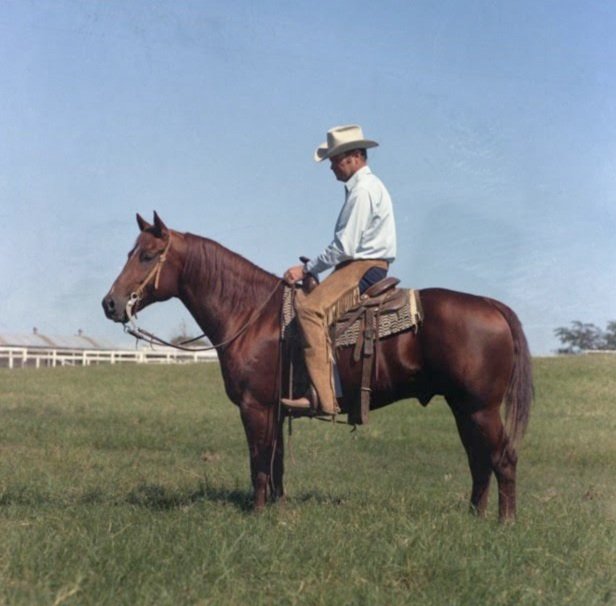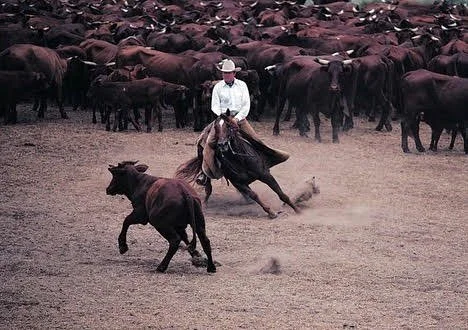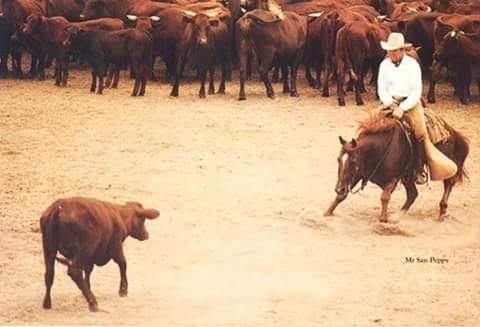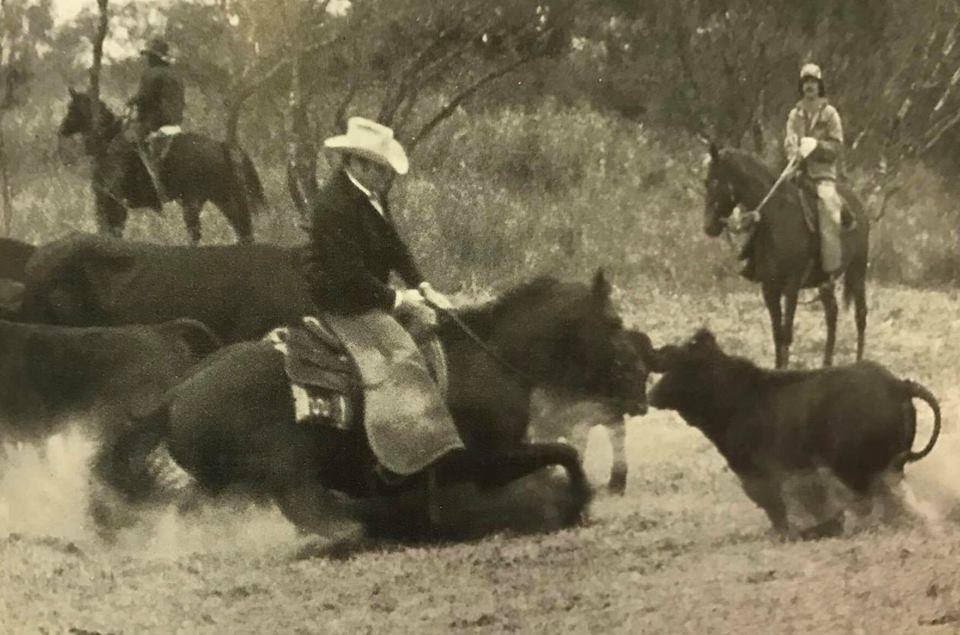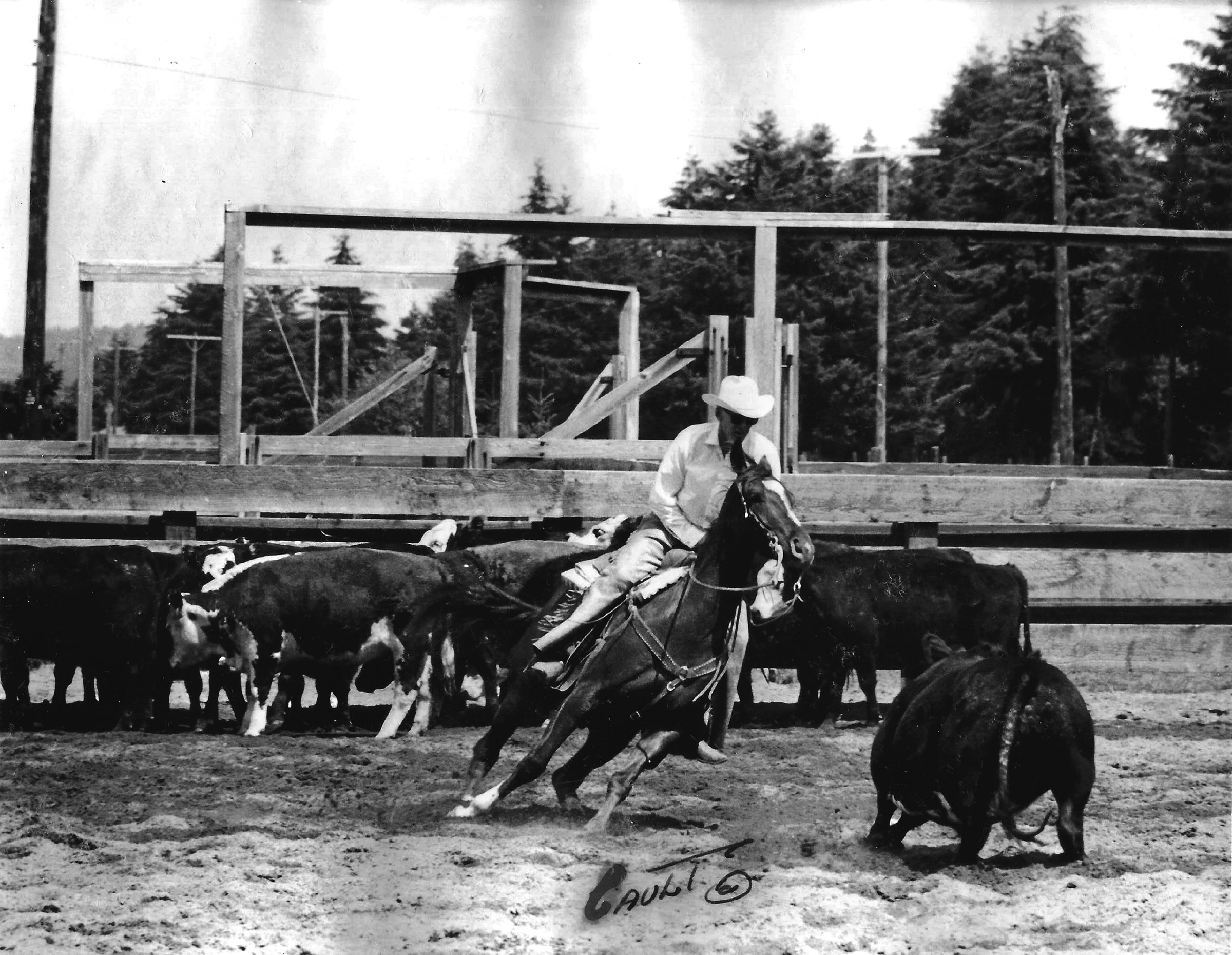
t9o ranch: A History of Legendary Horses and Horsemen
Nestled in the rolling hills of the Tenino Prairie is the iconic T9O Ranch. From cutting horses to the racetrack, the T9O Ranch is steeped in legendary horses and horsemen.
The original T9O Ranch property was homesteaded in 1850. Nearly a century later Sam Agnew, a Northwest timber industry icon, purchased the land to raise Hereford cattle to feed the logging crews who worked for him in Lewis County. His son Jay (S.J. Agnew) would return from World War II to become his partner in building the cattle herd and managing the T9O Ranch operations.
While Sam and Jay Agnew’s T9O Ranch would become a highly successful commercial cattle operation, it was the Agnew’s contribution to horse breeding that would leave an indelible mark on history. Thanks to the family’s love for horses and horse racing, over the years some of the biggest names in horse racing and cutting were associated with Agnew’s T9O Ranch.
It started in earnest with Jay’s purchase of his first Thoroughbreds in 1946, sired by a son of the famous Man o’ War. It wasn’t long before the father-son team were working towards building one of the largest Thoroughbred racing breeding farms in Washington.
The Agnew’s love of horses wasn’t reserved for just Thoroughbreds. They also bred some of horse racing’s top Quarter Horse runners. But Jay’s passion was cutting horses, and he would become one of the top non-pro cutting competitors in the country in the 1960s and 1970s. It was his theory that an infusion of Thoroughbred bloodlines into Quarter Horse cutting pedigrees could make a better cow horse.
According to Jay’s son, Dan, “My father found that there were some Thoroughbreds who had a lot of ‘cow’ in them.” Dan recounts that Jay would bring his retired Thoroughbred racehorses to the T90 Ranch to introduce them to cow work. “He found they were as good or better than a lot of Quarter Horses because they had been bred to race. He could ride Thoroughbreds all day gathering cattle and they wouldn’t even break a sweat.”
History would repeatedly prove that Jay Agnew was onto something with his belief that Thoroughbred blood could improve Quarter Horse cutting pedigrees.
In fact, one of Jay’s top working horses would be the Thoroughbred gelding For Amble—and the trainer of For Amble was none other than Marvin Guptill, renowned PNW cutting trainer and competitor (and great grandfather of the current T9O Ranch owner). Marvin was considered one of the vanguards of cutting in the Northwest and helped found the Northwest Cutting Horse Association. “Marvin Guptill’s life with cutting spans the formative years of the sport, a time when cutting was barely known, let alone popular.” Quarter Horse Northwest, May 1983
Known in Northwest cutting circles as “Mister Cow Cutter” and dubbed “Master of the Music Mount Line”, Marvin trained several cutting prospects for Sam and Jay Agnew—Zans Coke, Totsey H’s Bob, For Amble and Tenino Dan.
The T9O Ranch’s intersection with the founding fathers of cutting didn’t end with Marvin Guptill. In 1966, cutting legend Buster Welch won the National Cutting Horse Association (NCHA) Futurity on Rey Jay’s Pete, an unregistered half-Thoroughbred gelding sired by cutting sensation Rey Jay. Buster bought Rey Jay’s Pete after their championship and then sold him to his friend Jay Agnew. Riding Rey Jay’s Pete, Jay went on to place in the NCHA Non-Pro Top Ten in 1969 and 1971.
Next Buster and Jay partnered to buy Mr San Peppy; Buster rode Mr San Peppy to win the NCHA Open World Championship twice—in 1974 and 1976. The pair also won the AQHA World Cutting Championship in 1976.
Mr San Peppy would shape the course of cutting and cow-horse breeding, and his son, Peppy San Badger, would eclipse even his sire’s accomplishments (with Buster Welch again in the saddle). The pair would win the NCHA Futurity in 1977, the Derby in 1978, the Reserve World Championship in 1980, and the 1981 Open World Championship in 1981. Peppy San Badger would go on to become one of the lead cutting horse sires of all time.
Jay bred his half Thoroughbred mare, Tenino Fair, whose sire was Doc Bar, to Peppy San Badger. The result was Little Tenina, 1991 NCHA Futurity Champion, 1992 Derby Champion, and two time Top Ten Open winner, Little Tenina. Tenino Fair was also the dam of Tenino San, 1982 NCHA Open World Champion and NCHA Hall of Fame inductee, San Peppy Sam, Badge of Courage, Tenino Badger and Lil Tenino Fair.
In all, the offspring of Jay’s half Thoroughbred mare, Tenino Fair, would earn nearly a million NCHA dollars. As Buster Welch recounted, “Jay was one of the most knowledgeable horsemen that I was ever around. He loved Thoroughbreds, but he loved cutting horses, too. He always said that the only Thoroughbred that hurts a Quarter Horse is what they don’t have.”
Jay Agnew was posthumously inducted into the NCHA Member Hall of Fame in 2002.
The 1980s marked a shift away from cutting horse breeding for T9O Ranch as Jay’s son, Dan, focused on Thoroughbred breeding. In 1984 he renamed the ranch DanDar Farm and over the next decade stood some of the state’s preeminent racing stallions, including four-time leading Washington sire Staff Writer, Captain Courageous, Just the Time, Drouilly and Peterhof. At one time DanDar Farm was home to 279 Thoroughbreds.
In 1993 DanDar Farm was sold to a timber company and by 2002 it was home to the largest alpaca herd in North America.
In 2020 a portion of the original T9O Ranch was purchased by a life-long Tenino resident (and great grandson of Marvin Guptill) and thus began the multi-phase process of restoring the property into a destination equine breeding, training, rehabilitation, and event facility. The name T9O Ranch was chosen as an homage to the legendary horses and horsemen of the original T9O Ranch who made lasting contributions to the horse world.
Jay Agnew on 1966 NCHA Futurity Champion Rey Jay’s Pete, the unregistered, half-Thoroughbred he purchased from Buster Welch. Jay and Rey Jay’s Pete would place in the NCHA Non-Pro Top Ten in 1969 and 1971.
Legendary cutting cowboy Buster Welch and Mr San Peppy.
Jay Agnew partnered with cutting legend Buster Welch to buy Mr San Peppy; Buster rode Mr San Peppy to win the NCHA Open World Championship in 1974 and 1976. The pair also won the AQHA World Cutting Championship in 1976. Mr San Peppy would shape the course of cutting and cow-horse breeding.
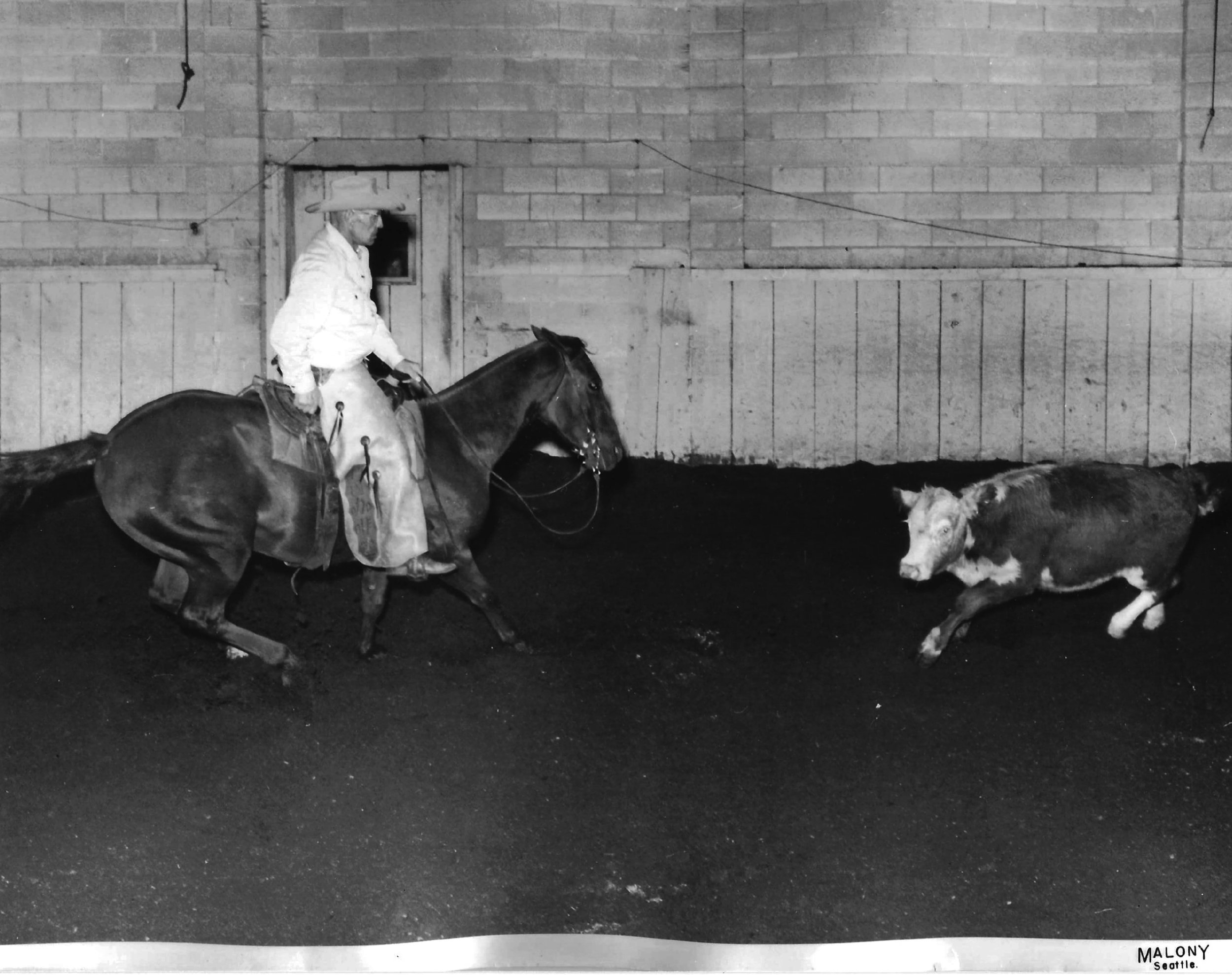
Known in Northwest cutting circles as “Mister Cow Cutter,” Marvin Guptill trained several cutting prospects for Sam and Jay Agnew—including Zans Coke.
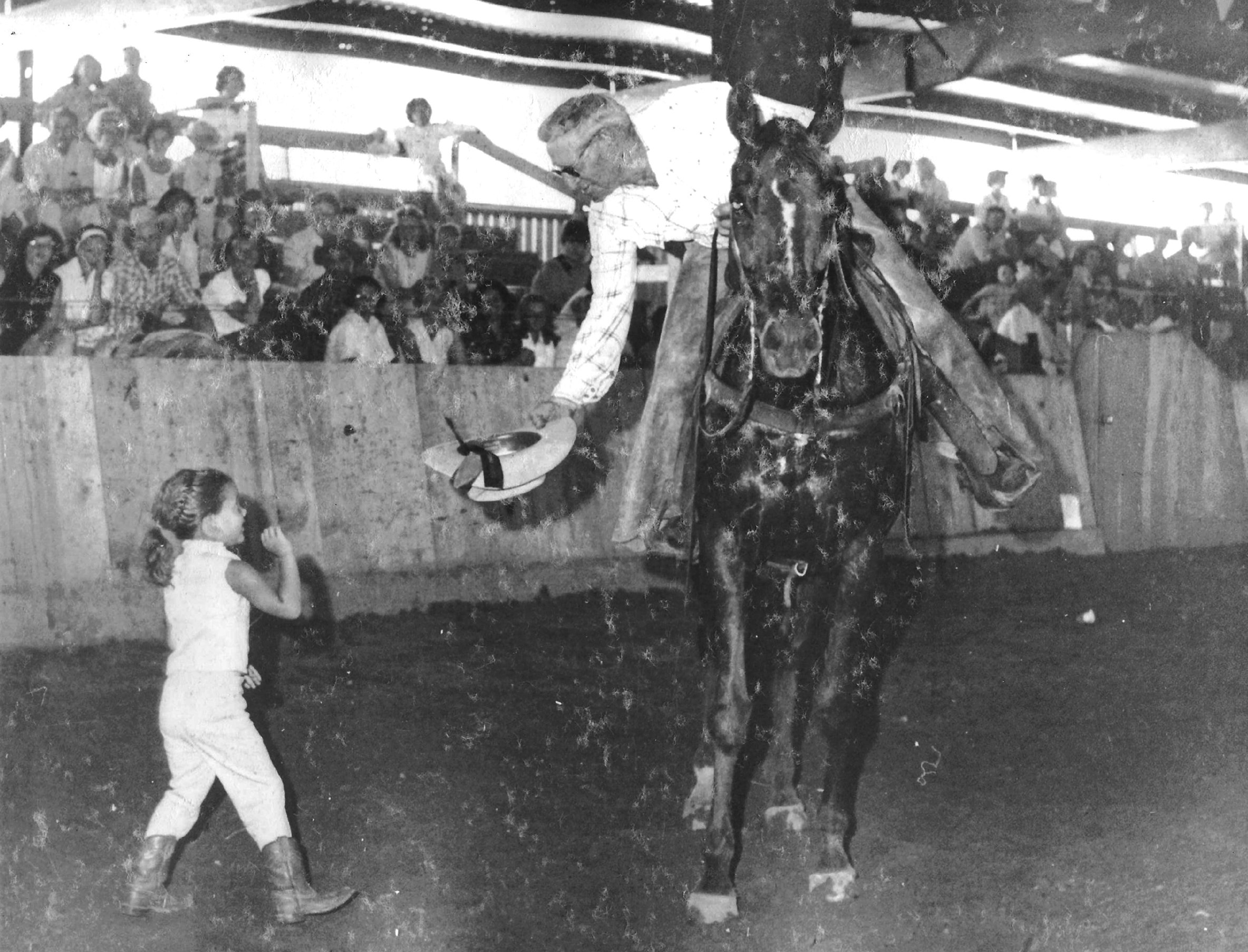
Cutting trainer Marvin Guptill on Jay Agnew’s thoroughbred For Amble.

Northwest cutting trainer Marvin Guptill trained and rode Music Mount to multiple cutting championships—Guptill, who was dubbed the “Master of the Music Mount line,” trained several cutting prospects for Sam and Jay Agnew.


